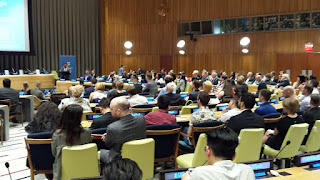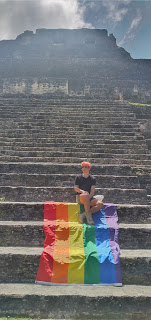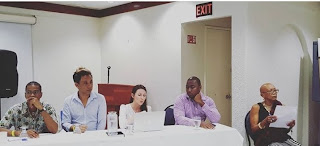CARIFLAGS History in LGBT Movement in the Caribbean
Posted 6th October, 2014
The Caribbean can be said to have, arguably and embryonic LGBT movement building process that have been evolving since 1997, with activists being more successful at advancing rights protection and enforcement issues at the national than regional level. There has been litigation work in Guyana, Jamaica and Belize while the use of UN Human rights system has allowed Guyana to put the issue of decriminalisation in the laps of Government once more. CAISO had pushed the issue of adding AGE, Sexual orientation to be added to the Equal Opportunity Act in TnT while all organizations in the region have been influenced by HIV issues, an effort, is underway to institutionalised strategies in human rights, culture, health, spirituality and research that takes advantage of the regions regional institutions.
In 2006, a regional meeting was held to revitalise C-FLAG as it was known in Ocho Rios, Jamaica
with activists from 15 countries who decided to relaunch
C-FLAG with a yahoo listserve while in 2007 Belize attended a meeting in the Dominican Republic which triggered UniBAM decriminaliation strategy that became case 668 of 2010. While it was an informal discussion base on an initiative from the University of the West Indies Rights Advocacy Project (URAP), the initiation and development of legal documents was pushed hard by UniBAM after its first UNDP meeting on marginalized groups organized by the Caribbean Vulnerable Communities.
While in Barbados, 2008 LGBT activists sought to develop a regional plan around the issues of Human Rights, Culture, Health and Research. The relationship and times has evolved but the principle of regionalism have not been lost since 1997 when the first effort was made in Curacao to have the first LGBT meeting in the region. Belize contributed extensively to the contents of this regional plan and while there, received news that it was an alternate speaker at the High Level meeting in New York on HIV and worked with the Dominican Republic speaker Leonardo Sanchez, to draft a 2 minute speech for his translation into Spanish at the United Nations seen below. From this experience came the slow awareness about the value of international education on the region activities in expanding the fight. Though, it was not our first effort at regional representation, as Kelvin Ramnarace of Belize, along with a female doctor were the at the then called C-FLAG meeting in 1997.
The Caribbean
Forum for Liberation and Acceptance of all Genders and Sexualities was founded in 1997 at a meeting
in Curaçao of around 70 LGBT people from 17 countries, with a focus on
community empowerment, HIV and other issues. It faced challenges with
communication and sustainability, and did not survive. But new local LGBT
groups did emerge, as well as a new HIV-funded region wide group focused on
several Caribbean Vulnerable Communities. Starting in 2008, in Barbados, the
name was changed to CariFLAGS, and the mission re-focused on human rights,
health, culture and spirituality. Further plans were made for registration, a
communications secretariat, and a shift from individual to organizational
membership – but leaders had mixed success working together. Recognizing this
and the sense that we still need to build a regional movement, 35 LGBT leaders from 13 countries reviewed the mistakes of the past and decided
to take a new approach to this work and use a meeting in St. Lucia to move
forward in a new way.
Advancing the Principle of regionalism, can be said, to be as difficult as the development and evolution of CARICOM institutions and effort at economic and political integration, for C-FLAGS, changed leadership structure with the passing of the baton to Joel Simpson of SASOD in Guyana.
Over time, as meetings were held off and on, activists began to become aware that the work of regionalism existed in an atmosphere of closet politics, 11 anglo-phone countries retaining buggery or sodomy laws, little protection or engagement about social justice issues and the effect of US evangelical exportation of hate. As, health-base organizations gained capacity in administration and community mobilisation, their experience has collective helped to shaped how activists in the region saw strategy like the value of political engagement and regional funding; taking advantage of Human Rights systems like the Universal Periodic Review, the use of the OAS system etc. and the leveraging of finite resources to advance rights at home.
So work was undertaken in 2012 in Port of Spain, to refine regional strategies at a meeting that had representatives of Jamaica, Belize, TnT, St. Lucia and others to refine the vision and mission of what is now known as CARIFLAGS or the Caribbean Forum for the Liberation and Acceptance of all Genders and Sexualities. That process continued in 2014 with a regional meeting in Belize-as seen in photo below- and follow-up meeting in Guyana in November, 2014 to finally develop a regional advocacy plan. With the approval of a regional grant from the Democracy, Rights and Labour Office of the US State Department, it is believed the region has come a long way in structuring itself and understanding its political regional environment.
We now see, The American had Stone Wall, but the region now has, in Jamaica JFLAG, SaSOD in Guyana, UniBAM in Belize, United and Strong in St. Lucia, CAISO and Friends for Life in TnT, GrenChaps in Grenada, MirDom in Dominica, SASH in Bahamas, Rainbow Alliance in Bermuda, Amigos Siempre Amigos in the Dominican Republic, The Pink House in Curacao. The Mexicans had Tlatelolco massacre in the afternoon and night of October 2, 1968, in the Plaza de las Tres Culturas in the Tlatelolco section of Mexico City where an estimate 200-300 deaths were reported with many more wounded or arrested in the thousands. Challenges has not been this bloody in any country, as that experience in the lost of life in Mexico, but the challenges remains in the advancement of social, cultural and political protections. Below is a summary of these issues along with efforts made in the region.
St. Lucia United and Strong:
St Lucia’s first and only LGBT organisation, United and Strong Inc (U&S) formed in 2001 and was registered in November of 2005 in collaboration with the Caribbean AIDS Alliance in response to the HIV and AIDS epidemic. It has leveraged its relationship Globally, Regionally, hemispherically to improve its impact back at home. Issuing Shadow reports to the UPR process and making its constitutional submission in 2009.
Guyana SASOD:
St Lucia’s first and only LGBT organisation, United and Strong Inc (U&S) formed in 2001 and was registered in November of 2005 in collaboration with the Caribbean AIDS Alliance in response to the HIV and AIDS epidemic. It has leveraged its relationship Globally, Regionally, hemispherically to improve its impact back at home. Issuing Shadow reports to the UPR process and making its constitutional submission in 2009.
Guyana SASOD:
Seemingly inspired by post-apartheid South Africa's robust constitution,
the National Assembly in 2001 unanimously passed a constitutional
amendment bill with comprehensive reforms, including new expressly
prohibited grounds of discrimination. Three new grounds in particular
raised the ire of sections of the religious community: marital status,
religious vilification and sexual orientation. Initially campaigning
against all three, but eventually settling for the biggest perceived
sin, sections of the evangelical Christian and Muslim communities
managed to convince then-President Bharrat Jagdeo not to assent to the
bill but to send it back to the National Assembly for reconsideration.
The bill came up in Parliament again in 2003, and this was a key moment
in SASOD's genesis.
Bermuda Rainbow Alliance
The Alliance is a group of allies who operate as a collective, founded July30th, 2012 has much to celebrate, including the long-awaited passing of the Human Rights Act amendment in June 2013. Unfortunately, however, this amendment falls short when it comes to protection with regard to discrimination on the grounds of gender identity and gender expression.
Belize:
The United Belize Advocacy Movement (UniBAM) became and NGO on May 4th, 2006. Some 8 years after the founding of JFLAG. With American Scott Stirm being quoted in the Amandala about UniBAM decriminalisation work as opening a "demonic gate way" while his colleague speaking on his Rise and Shine Morning Show calling UniBAM OAS presentation in 2014, "a pack of lies straight from the Pitts of hell." The organization have watched at Church leaders attack the criminal code amendments of 2013 that extended protection of sexual violence to boys and march against the gender policy and UNIBAM in 2013. While the Belize PM speech of September 2013 has changed the tone of political engagement, like Portia Simpson, there has been no substance to the adjustment in tone to extend legislative protection to address discrimination, hate speech and crime. Belize too has turned to litigation as a strategy to push its rights protection and enforcement concerns.
Jamaica:
JFLAG was founded in 1998. Since then, The European Parliament in 2005 passed a resolution calling on Jamaica to repeal its "antiquated and discriminatory sodomy laws and to actively combat widespread homophobia" while Jamaican Prime Minister Portia Simpson's pledge that "no one should be discriminated against because of their sexual orientation. Maurice Tomlinson filed a case against Jamaica at the Inter-American Commission on Human Rights in February 2012 and another in February 2013 to challenge the buggery law which was withdrawn because for safety reasons from the Jamaican courts. He filed a 3rd case on censorship in the media with hearings done in May, 2013, which he lost.
CFLAGS remain as a regional potential, as its presence have been leveraged to address the Professor Bain issue, its had signed on the numerous petitions, press releases and have coordinated in the region work on the UN resolution on Extrajudicial Killings. What it does in the next couple of years in pushing faster institutional change will remain a fascinating process, as its activists learn to define regional strategy that has a regional effort..
Source:
Rainbow Alliance:
Latin American Paper on LGBT Movement Building
The Queer Caribbean Conflicting use of post Colonial Past
http://notchesblog.com/2014/05/29/the-queer-caribbean-conflicting-uses-of-the-colonial-past/
Jamaica:
Censorship Case
St. Lucia:
Constitutional Reform Submission
SaSOD








Comments
Post a Comment